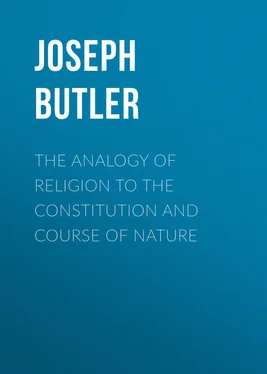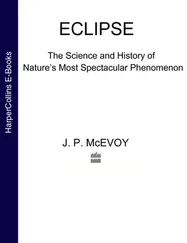Joseph Butler - The Analogy of Religion to the Constitution and Course of Nature
Здесь есть возможность читать онлайн «Joseph Butler - The Analogy of Religion to the Constitution and Course of Nature» — ознакомительный отрывок электронной книги совершенно бесплатно, а после прочтения отрывка купить полную версию. В некоторых случаях можно слушать аудио, скачать через торрент в формате fb2 и присутствует краткое содержание. Жанр: foreign_antique, foreign_prose, на английском языке. Описание произведения, (предисловие) а так же отзывы посетителей доступны на портале библиотеки ЛибКат.
- Название:The Analogy of Religion to the Constitution and Course of Nature
- Автор:
- Жанр:
- Год:неизвестен
- ISBN:нет данных
- Рейтинг книги:3 / 5. Голосов: 1
-
Избранное:Добавить в избранное
- Отзывы:
-
Ваша оценка:
- 60
- 1
- 2
- 3
- 4
- 5
The Analogy of Religion to the Constitution and Course of Nature: краткое содержание, описание и аннотация
Предлагаем к чтению аннотацию, описание, краткое содержание или предисловие (зависит от того, что написал сам автор книги «The Analogy of Religion to the Constitution and Course of Nature»). Если вы не нашли необходимую информацию о книге — напишите в комментариях, мы постараемся отыскать её.
The Analogy of Religion to the Constitution and Course of Nature — читать онлайн ознакомительный отрывок
Ниже представлен текст книги, разбитый по страницам. Система сохранения места последней прочитанной страницы, позволяет с удобством читать онлайн бесплатно книгу «The Analogy of Religion to the Constitution and Course of Nature», без необходимости каждый раз заново искать на чём Вы остановились. Поставьте закладку, и сможете в любой момент перейти на страницу, на которой закончили чтение.
Интервал:
Закладка:
Nor can we find any thing throughout the whole analogy of nature to afford us even the slightest presumption, that animals ever lose their living powers; much less if it were possible, that they lose them by death: for we have no faculties wherewith to trace any beyond or through it, so as to see what becomes of them. This event removes them from our view. It destroys the sensible proof, which we had before their death, of their being possessed of living powers, but does not appear to afford the least reason to believe that they are, then, or by that event, deprived of them.
Our knowing that they were possessed of these powers, up to the very period to which we have faculties capable of tracing them, is itself a probability of their retaining them beyond it. This is confirmed, and a sensible credibility is given to it, by observing the very great and astonishing changes which we have experienced; so great, that our existence in another state of life, of perception and of action, will be but according to a method of providential conduct, the like to which has been already exercised even with regard to ourselves; according to a course of nature, the like to which we have already gone through.
However, as one cannot but be greatly sensible, how difficult it is to silence imagination enough to make the voice of reason even distinctly heard in this case; as we are accustomed, from our youth up, to indulge that forward, delusive faculty, ever obtruding beyond its sphere; (of some assistance indeed to apprehension, but the author of all error,) as we plainly lose ourselves in gross and crude conceptions of things, taking for granted that we are acquainted with what indeed we are wholly ignorant of: it may be proper to consider the imaginary presumptions, that death will be our destruction, arising from these kinds of early and lasting prejudices; and to show how little they really amount to, even though we cannot wholly divest ourselves of them. And,
I. All presumption of death’s being the destruction of living beings, must go upon supposition that they are compounded; 31 31 [Dodwell had published a book, in which he argues that human souls are not naturally immortal, but become so, by the power of the Holy Ghost, in regeneration. Dr. Clarke replied. The controversy was continued by Collins. Dr. C. wrote four tracts on the subject.These “presumptions” form the base of materialism, and hence the denial of a future state. Surely, thoughts and feelings, if material, have extension. But can any one conceive of love a foot long, or anger an inch thick? How superior to the gloomy mists of modern infidels have even pagans been! Cicero makes Cato say, “The soul is a simple, uncompounded substance, without parts or mixture: it cannot be divided, and so cannot perish.” And in another place, “I never could believe that the soul lost its senses by escaping from senseless matter; or that such a release will not enlarge and improve its powers;” and again, “I am persuaded that I shall only begin truly to live, when I cease to live in this world,” Xenophon reports Cyrus as saying, in his last moments, “O my sons! do not imagine that when death has taken me from you, I shall cease to exist.”]
and so, discerptible. But since consciousness is a single and indivisible power, it should seem that the subject in which it resides must be so too. For were the motion of any particle of matter absolutely one and indivisible, so as that it should imply a contradiction to suppose part of this motion to exist, and part not to exist, i. e. part of this matter to move, and part to be at rest, then its power of motion would be indivisible; and so also would the subject in which the power inheres, namely, the particle of matter: for if this could be divided into two, one part might be moved and the other at rest, which is contrary to the supposition.
In like manner it has been argued, 32 32 See Dr. Clarke’s Letter to Mr. Dodwell, and the defences of it.
and, for any thing appearing to the contrary, justly, that since the perception or consciousness, which we have of our own existence, is indivisible, so as that it is a contradiction to suppose one part of it should be here and the other there; the perceptive power, or the power of consciousness, is indivisible too: and consequently the subject in which it resides, i. e. the conscious being. Now, upon supposition that the living agent each man calls himself, is thus a single being, which there is at least no more difficulty in conceiving than in conceiving it to be a compound, and of which there is the proof now mentioned; it follows, that our organized bodies are no more ourselves or part of ourselves, than any other matter around us. And it is as easy to conceive, how matter, which is no part of ourselves, may be appropriated to us in the manner which our present bodies are; as how we can receive impressions from, and have power over, any matter. It is as easy to conceive, that we may exist out of bodies, as in them; and that we might have animated bodies of any other organs and senses wholly different from these now given us; and that we may hereafter animate these same or new bodies, variously modified and organized; as to conceive how we can animate such bodies as our present. And lastly, the dissolution of all these several organized bodies, supposing ourselves to have successively animated them, would have no more conceivable tendency to destroy the living beings ourselves, or deprive us of living faculties, the faculties of perception and of action, than the dissolution of any foreign matter, which we are capable of receiving impressions from, and making use of, for the common occasions of life.
II. The simplicity and absolute oneness of a living agent cannot, from the nature of the thing, be properly proved by experimental observations. But as these fall in with the supposition of its unity, so they plainly lead us to conclude certainly, that our gross organized bodies, with which we perceive objects of sense, and with which we act, are no part of ourselves; and therefore show us, that we have no reason to believe their destruction to be ours: even without determining whether our living substance be material or immaterial. For we see by experience, that men may lose their limbs, their organs of sense, and even the greatest part of these bodies, and yet remain the same living agents. Persons can trace up the existence of themselves to a time, when the bulk of their bodies was extremely small, in comparison of what it is in mature age: and we cannot but think, that they might then have lost a considerable part of that small body, and yet have remained the same living agents; as they may now lose great part of their present body, and remain so. And it is certain, that the bodies of all animals are in a constant flux; 33 33 [As every particle of our bodies is changed within seven years, an average life would take us through many such changes. If the mind changes with the body, it would be unjust for an old man to be made to suffer for the sins of his youth. To escape this, the materialist is driven to affirm that the whole is not altered, though every particle be changed.This argument from the constant flux is irresistible. It proves our identity, and that matter and mind are not the same. Does it not also destroy all presumption that the Ego cannot exist without this particular body?]
from that never-ceasing attrition, which there is in every part of them. Now, things of this kind unavoidably teach us to distinguish, between these living agents ourselves, and large quantities of matter, in which we are very nearly interested; since these may be alienated, and actually are in a daily course of succession, and changing their owners; whilst we are assured, that each living agent remains one and the same permanent being. 34 34 See Dissertation I .
And this general observation leads us on to the following ones.
Интервал:
Закладка:
Похожие книги на «The Analogy of Religion to the Constitution and Course of Nature»
Представляем Вашему вниманию похожие книги на «The Analogy of Religion to the Constitution and Course of Nature» списком для выбора. Мы отобрали схожую по названию и смыслу литературу в надежде предоставить читателям больше вариантов отыскать новые, интересные, ещё непрочитанные произведения.
Обсуждение, отзывы о книге «The Analogy of Religion to the Constitution and Course of Nature» и просто собственные мнения читателей. Оставьте ваши комментарии, напишите, что Вы думаете о произведении, его смысле или главных героях. Укажите что конкретно понравилось, а что нет, и почему Вы так считаете.












